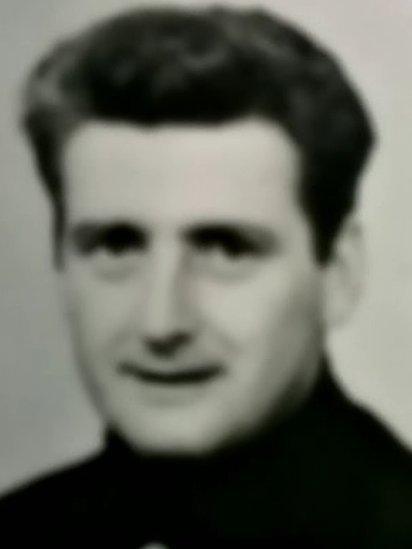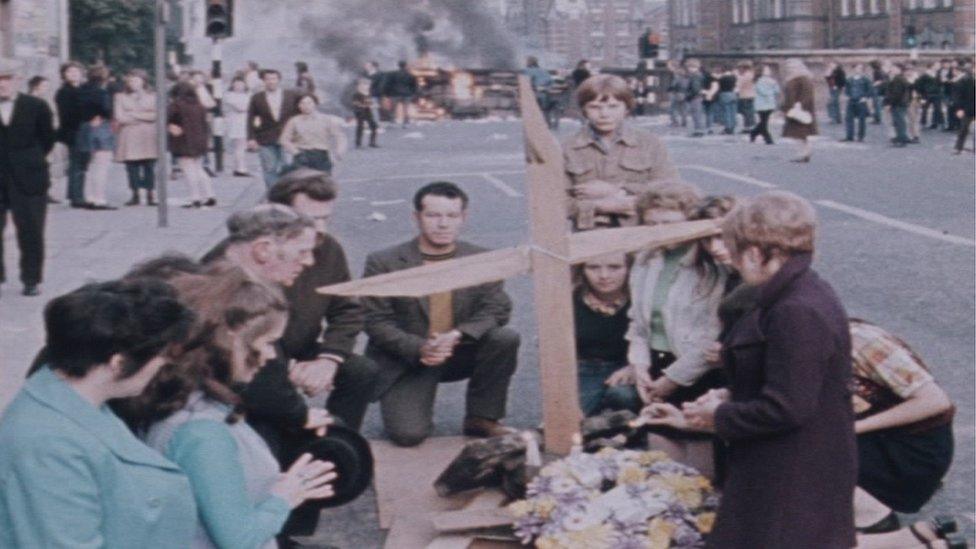Harry Thornton inquest: Ex-soldier defends witness account of shooting
- Published

Harry Thornton, a father of six children, was shot dead by the Army in 1971
A former soldier giving evidence at an inquest into the Army killing of a civilian in Belfast in 1971 has denied making up his own version of events.
Twenty-nine-year-old Harry Thornton, who was a father of six, was shot dead by another soldier as he drove past Springfield Road police station.
The witness was a teenage soldier in the Parachute Regiment at the time.
He has been giving evidence from behind a screen during the inquest in Belfast and is referred to only as "Soldier C".
'False statements'
He told the court on Tuesday that he believed a passenger in the van that Mr Thornton was driving had pointed a weapon out of the window of the vehicle and that two shots had been fired.
Soldier C also told Tuesday's hearing that he did not believe the two bangs he heard were the van backfiring.
On Wednesday morning, counsel for the Thornton family questioned the former paratrooper's version of events.
The lawyer produced Ministry of Defence (MoD) personnel files showing that before the shooting, Soldier C had pleaded guilty to Army charges of being asleep while on sentry duty, and of being inattentive while on patrol.
He also produced evidence of a traffic incident in 1975 where Soldier C had made false statements.
The family's lawyer told the witness: "You cannot tell the truth, you manipulate the truth."
Soldier C replied: "That is incorrect"
Looking at the comments of commanding officers about Soldier C, the Thornton family's lawyer quoted an Army captain and a major from redacted documents.
'British Empire Medal'
One of them said of Soldier C: "He must learn to tell the unvarnished truth."
The commanding officer added: "He always has a plausible injured innocence."
Soldier C told the court that he was still in the Army 26 years later and had been awarded the British Empire Medal.
"If I was that bad a soldier... why was I still in the regiment?" he asked.
Counsel for the MoD and the Police Service of Northern Ireland (PSNI) pointed out that Soldier C had travelled to Belfast and co-operated with the inquest voluntarily, despite ill health.
After completing his evidence to the inquest, Soldier C made a brief statement saying he felt that it was important that someone who was there at the time of the shooting said "sorry".

A vigil was held after Harry Thornton's death in 1971 but the shooting also sparked rioting
The man who fired the fatal shot, known at the inquest as Soldier A, has since died.
Mr Thornton was an unarmed civilian who had no connection to any paramilitary group.
Following his death in 1971 there was sustained rioting in west Belfast.
The killings of 10 people who were shot dead by the Army, in a period later known by the victims' families as the Ballymurphy Massacre, began two days later.
In 2012, the government wrote a letter of apology to Mr Thornton widow, Mary, confirming that her husband had been an "innocent man".